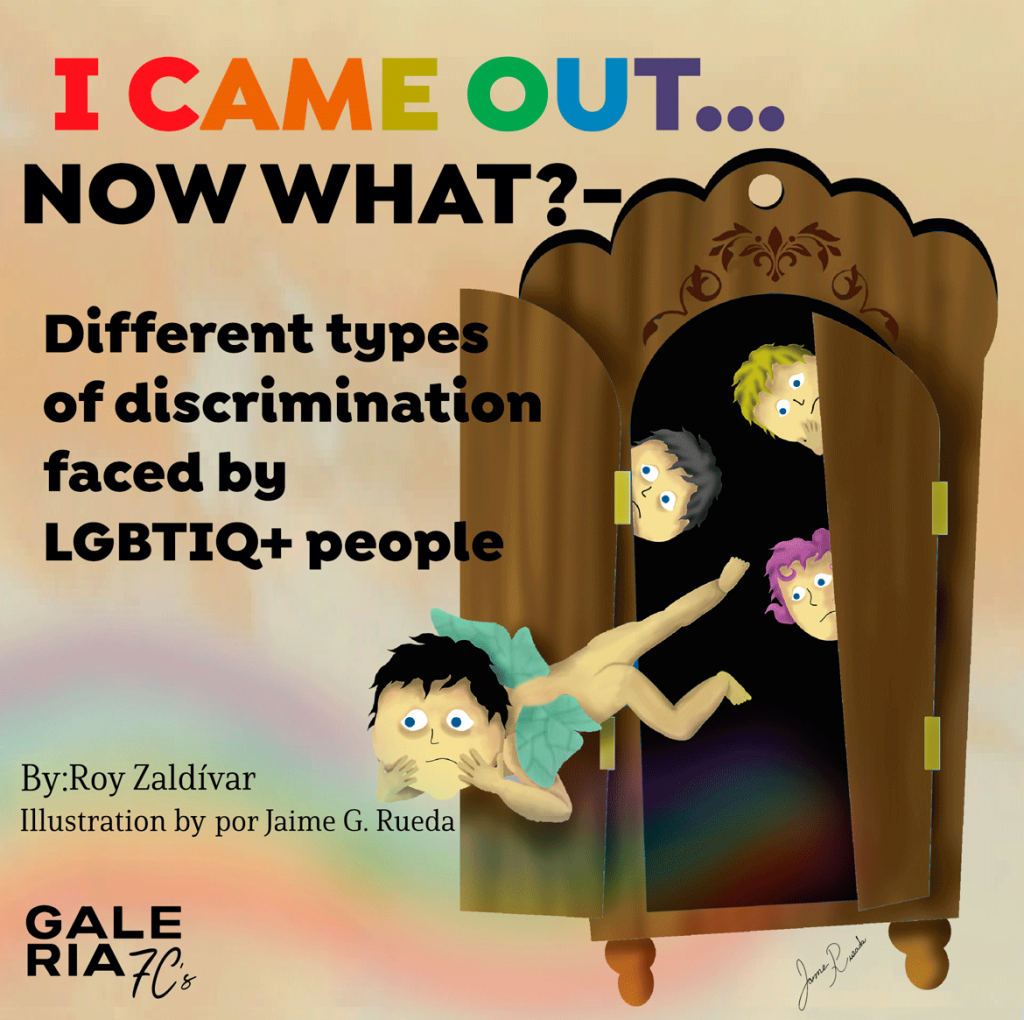
By: Roy Zaldívar
For LGBTIQ + people, being “out of the closet”, despite the fact that it is a very individual experience, for all means a risk, either to a lesser or greater degree, since living a non-regulated dissidence exposes us to situations of violence and discrimination . Those who decide to say so publicly must be aware of the challenges they will face. Beyond physical violence, there are situations that, although they do not endanger our life, diminish its quality, of which we will mention some below.
Educational Discrimination
Usually, discrimination against sexgeneric dissidents (people who do not align themselves with the imposed social norm of heterosexuality) and their little attention from the state, causes spaces such as classrooms to be unsuitable for sexgeneric dissidents and therefore, there are high dropout rates by community members. According to the National Diagnosis on discrimination against LGBTIQ + people in Mexico, more than two out of three people surveyed experienced discrimination in educational spaces, only 34% said they had never experienced it.
The school serves as one of the places where young people build their individual identity. It is also the place where, through interaction, we define how we relate to others by following norms and values. The socialization dynamics that are carried out there will be decisive in the future actions of the students, as well as the level of development they achieve.
Usually the discrimination of LGBTIQ + people motivated by sexual orientation and gender identity, impacts on the lives of these people, attracting with it higher rates of illiteracy, unemployment and even forced prostitution, and therefore, less access to development possibilities and human rights.
A restructuring by the state of educational systems is necessary to make classrooms safe spaces for everyone, where a better understanding of the broad sexual diversity in our social reality is possible, in addition to the construction of a culture of respect as well as harmony between all the people that make up society.
Discrimination in the work area
Labor markets have been accompanied by mechanisms that discriminate and segregate certain groups in society, regardless of the capabilities and potential of individuals. Like classrooms, work spaces also tend to become hostile to those who are part of the LGBTIQ + community. According to the first National Survey on Homophobia at Work, carried out in Mexico, 35% of gay, lesbian, bisexual and transgender people have been victims of some type of discrimination in their workplace, according to data from the group Espolea A.C. The systematic exclusion in work spaces towards LGBTIQ + people increases marginalization in other areas and denies access to growth opportunities, as well as a decent life.
“Ramiro” who worked in a cafeteria for two years, began to notice some discrimination from his bosses, when he began to make his gender expression more visible. “The owner asked the manager to call my attention for wearing earrings, painting my nails and wearing eyeliner while working. I asked her for an explanation, and told her that what he was doing counted as discrimination based on gender expression and sexual orientation, and she immediately excused herself from it. They did not like that I was so rebellious and they never gave me the opportunity to have another position and this was evident when they gave a promotion to a boy who had been working there for less time, “says Ramiro.
Many of these cases happen every day where dissidents have to tolerate the constant signs of discrimination in their work spaces and although it is sanctioned in the law, people do not attend to report because they have no way to prove that they are victims of discrimination. Added to this is the ignorance of the multiple organizations that can provide you support, such as the Human Rights Commission (CNDH) and the National Commission to Prevent Discrimination (CONAPRED).
Family Rejection
Family rejection of sex-generic dissidents is a common phenomenon in Mexico, where tradition and religion are deeply rooted. Forms of discrimination range from deprivation of social and economic security, to constant passive aggressive comments made about the orientation or identity of people that have serious consequences for the safety and well-being of LGBTIQ + people.
The house is another space where LGBTIQ + people come to suffer from discrimination, where self-esteem and security can be more affected. Yocelin Cámara, Clinical Psychologist focused on comprehensive sexuality education, affirms “If, having found my identity and feeling more secure with it, I do not have the support of my family, it will cause a breakdown in self-concept. I will continue to see myself as I am, I will continue to know who I am, however, my expression of self-esteem or self-love will be broken if my family does not accept this construction of identity ”.
Although there are still people who because of their sexual orientation or gender identity are physically violated, and are even thrown out of their homes, there are other types of violence that are just as aggressive that members of the LGBTIQ + community can experience. One of them and one of the most common is economic violence, where parents threaten to withdraw support from their children, or take away resources for recreation, because they believe that in this way they can control or lessen their sexuality. freely and fully. There is also the daily violence that is hidden behind passive aggressive comments on the subject, with which they hide by saying “I have never told you anything”, but constantly show their dissatisfaction with the dissent of their children. Likewise, there is someone who completely withdraws speech from their children and makes their existence invisible to somehow “eliminate the problem.”
As LGBTIQ + people we have to deal with this rejection; it means weighing whether it is really worth who I am, to protect my physical well-being in a dangerous situation, or trying to have a more bearable relationship with your parents in a less risky context. For the latter, Camara recommends “If you want your home to remain a safe space, also give in a little, as long as this does not mean the sacrifice of your identity. Not sacrificing your identity but also not wanting people to go through the same process as you. You have to understand that just as we had our process and it was difficult for us to accept ourselves outside the norm, it will also cost the other person, although it should not be like that ”.
There are many ways in which sexgeneric dissidents are violated and it is a multifactorial situation that responds to their motives. However, the phenomenon of the beginning of the second decade of the 21st century, the health crisis caused by COVID-19, aggravated the state of vulnerability of LGBTIQ + people. Marta Ferreyra, General Director of Autonomy and Empowerment for Substantive Equality of Inmujeres, participated in the “Roundtable: Diversity and Inclusion”, organized by Grupo Expansión, commented that despite the progress made by the LGBT + community, ” the pandemic will accentuate discriminatory practices towards this group. The lives of many LGBT people, who already had precarious lives, are going to be precarious, due to health conditions, health care, housing, economic and incorporation to formal jobs. When we get out of this pandemic, the situation will be more precarious and more vulnerable for them ”.
It is important to recognize that knowing these, and many other forms of discrimination, to allow prevention, protection, respect, guarantee and promotion actions to be carried out, in order to eradicate and prevent violence against LGBTIQ + people. Likewise, the recognition of these forms of discrimination allows the authorities to identify the magnitude and intensity of said situation regarding the effective exercise of human rights, adopting special measures and following up on cases of LGBTIQ + violence.
